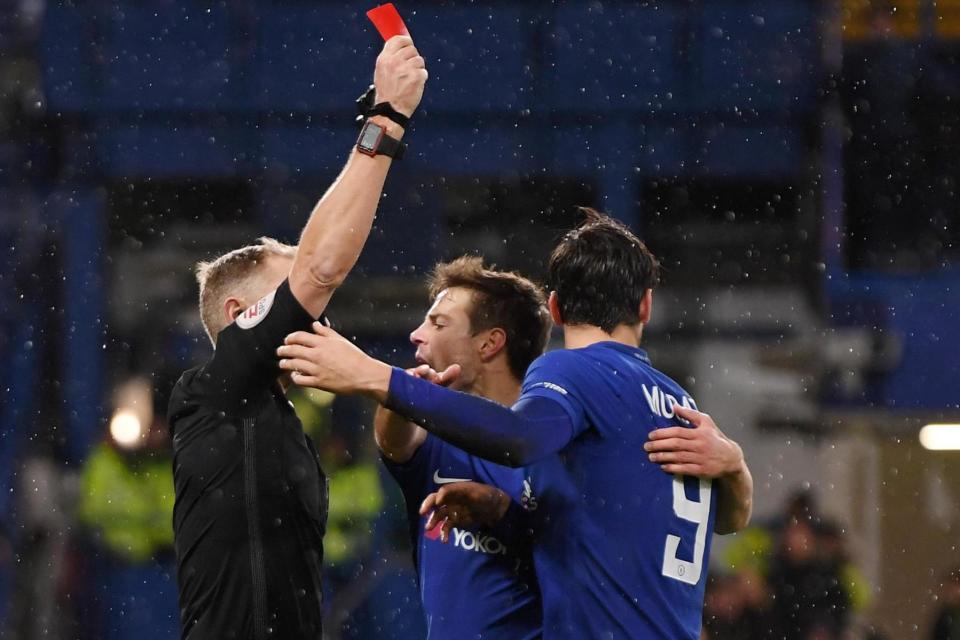VAR got Willian decision wrong but ex-Premier League ref blames diving culture

I said last week that VAR wasn’t going to solve the world’s issues within a few weeks, and it was quite obvious that the system needed a bedding in period. Wednesday night at Stamford Bridge proved that point.
It was never going to be a bed of roses and will continue create debate. It’s not foolproof and we’re still very much at the learning stage.
Much discussion came off the back of Chelsea’s FA Cup tie with Norwich.
READ MORE: VAR – All you need to know
READ MORE: Conte calls for VAR improvements
READ MORE: Nine-man Chelsea overcome Norwich on penalties
The game was incident-packed and very challenging to referee. Graham Scott was in the eye of a storm and yes, a mistake was made. It’s true that VAR didn’t help the situation. It went into hiding, but the bigger problem is not getting decisions right on diving – it’s simulation itself.
I’ve said many times that players hitting the floor is the hardest part of the game for any official at any level.
It’s incredibly hard to detect and it’s still the ugly side of football. The officials got a number right but one wrong – and it’s that one, Willian in the second half, that has some already suggesting the system is doomed to failure. The reality is that it was never going to eradicate the issue.
Last week I wrote that this isn’t a quick fix and that it’ll be suck-it-and-see until the dust settles and everyone, players, manager, fans and of course the officials get fully used to the process.
But let’s be clear. VAR is not going to sanitise every decision. It’s not there to re-referee matches. It’s there to be a silent supporting mechanism. Don’t think that this solve every issue, as it’s not what it’s there for.

The system is in place to solve only four things. They all have to be serious and obvious, or it won’t get involved.
It’s to help with red card decisions, penalties, mistaken identity and goals, which of course include the build up – like offsides and fouls before it. It’s not there to settle every indiscretion.
The Willian penalty incident was VAR’s first set-back but I expect lessons to be learned.
The bottom line is that it should have come in: The Brazilian was fouled and Chelsea should have earned a penalty kick. I would have expected the VAR to take a second look but for whatever reason it didn’t.
READ MORE: De Bruyne has never looked back since turning his back on Jose and Chelsea’s millions
READ MORE: Chelsea ready to go back in for Llorente
I think perhaps it hid behind the fact that it wasn’t seen as a ‘serious and obvious error’ and decided to stay quiet. It was – Mr Scott should have heard noises through his earpiece and acted.
What should have happened is that it should have been looked at twice and the match referee informed as quickly as possible that a mistake has been made and to halt play, bring it back and award the penalty.
In such circumstances, where the player was booked for simulation, the referee’s job after being told of the mistake would then be to officially rescind the yellow card by informing the players and the management of both sides that it no longer stands.
Let’s remember of course that the official was spot on in all the other big calls – and there were quite a few to get right.
It brings, though, a greater debate. Unlike with video technology, we haven’t seen enough progress made to stamp out diving. That is the big problem which just won’t go away.
The Regulatory Commission Panel was set-up, in part, to rid football of simulation. But until every act is put forward for review, and suitable punishment handed out, it will continue to blight the game.
That is why Wednesday’s FA Cup shortcoming is not just the fault of VAR.
Keith Hackett is a former Premier League referee and referees’ assessor as well as a director for You Are The Ref.

